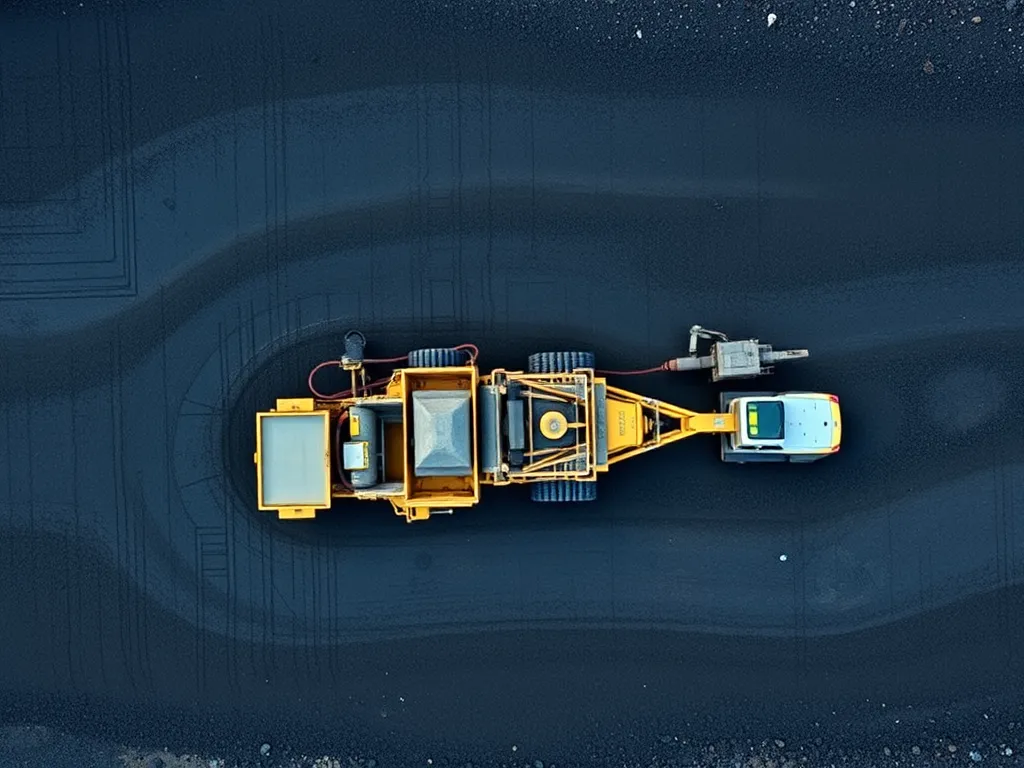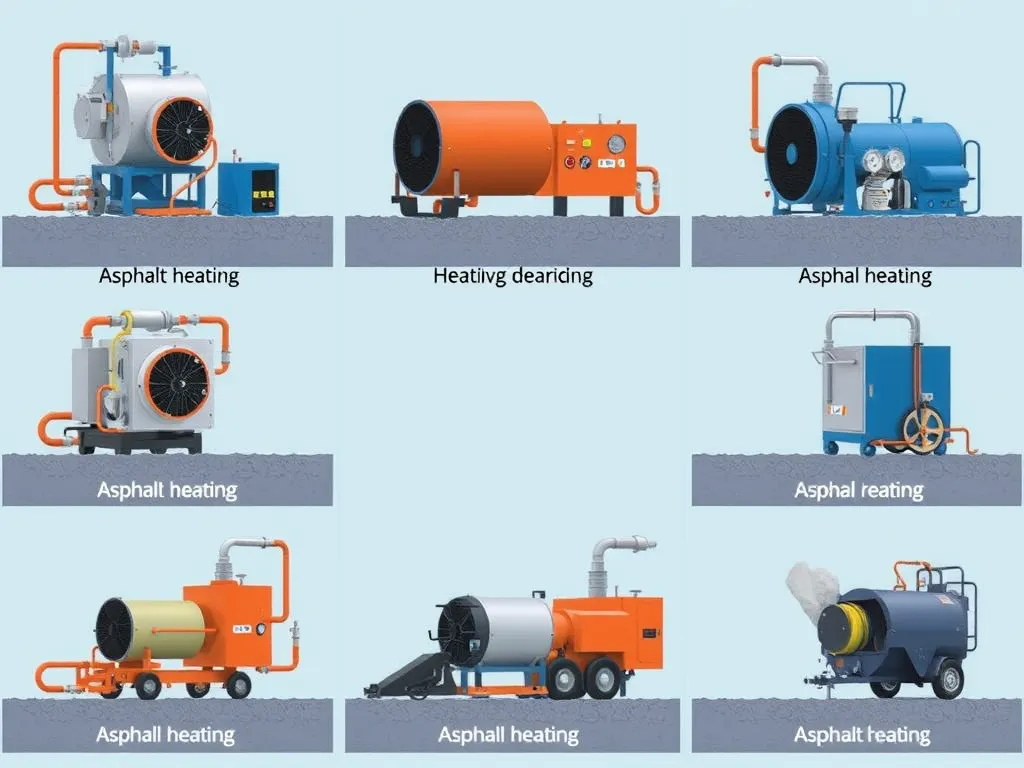Cold Mix Asphalt Equipment: Production, Types, and Costs
Published on: October 12, 2025 | Last Updated: April 14, 2025
Written By: George Voss
Cold mix asphalt equipment produces road repair materials without heating aggregates or binders. Unlike hot mix gear requiring temperatures above 300°F, these machines combine crushed stone, bitumen emulsion (a liquid asphalt binder), and additives at ambient conditions. Contractors use this gear for pothole fixes, temporary patches, and remote projects needing portable setups. Equipment types range from small batch mixers ($15,000-$50,000) to full-scale plants exceeding $250,000. Suppliers like Caterpillar and Astec Industries offer new and refurbished models with maintenance plans. Recent innovations include automated controls and energy-efficient designs cutting fuel use by 15-20%.
This article covers how cold mix equipment works, from mixing aggregates to final compaction. Compare costs for plants, mixers, vibratory rollers ($10,000-$75,000), and storage trailers. Learn maintenance routines that prevent downtime. Discover top manufacturers and where to buy leased or used machinery. Get data on production rates, material specs, and eco-friendly upgrades like solar-powered units.
Contents
- What is Cold Mix Asphalt?
- Types Of Cold Mix Asphalt Equipment
- Cold Mix Asphalt Production Process
- Cost Analysis Of Cold Mix Asphalt Equipment
- Maintenance Best Practices for Cold Mix Equipment
- Environmental Impact Of Cold Mix Asphalt Production
- Frequently Asked Questions (FAQs)
- Closing Thoughts
- Additional Resources for You:
What is Cold Mix Asphalt?
Cold mix asphalt serves as a versatile paving material for temporary repairs and remote projects. Unlike hot mix asphalt, it cures without heat, making it workable at ambient temperatures. Production involves combining aggregates with emulsified or cutback asphalt binders. This process allows stockpiling for months, ideal for emergency road maintenance.
Key Components Of Cold Mix Asphalt
Three primary elements form cold mix asphalt:
- Aggregates: Crushed stone, gravel, or sand (3/8″ to 1/4″ size) provide structural strength
- Bitumen emulsion: A blend of 60-70% bitumen, water, and emulsifiers creates a low-viscosity binder
- Additives: Polymers or latex (1-3% by weight) enhance cohesion and moisture resistance
Advantages and Limitations
Cold mix asphalt equipment balances unique benefits with specific operational constraints. The choice between cold and hot mix often depends on project scale, climate, and traffic demands.
Benefits of Using Cold Mix Asphalt
Cold mix offers distinct operational advantages:
- No heating required: Saves 30-40% energy vs hot mix production
- Year-round application: Applies in temperatures as low as 40°F (4°C)
- Minimal equipment: Basic cold mix asphalt mixers and compactors replace complex heating systems
Common Drawbacks to Consider
Trade-offs include:
- Lower strength: 2,000-3,000 psi vs hot mix’s 4,000+ psi
- Extended curing: Requires 24-72 hours for traffic readiness
- Weather sensitivity: Rain can wash out uncured patches
These material properties directly influence equipment selection—a factor we’ll explore when analyzing cold mix asphalt machinery types.
Types Of Cold Mix Asphalt Equipment
Cold mix asphalt gear ranges from small hand tools to large plants. Each type serves a role in mixing, laying, or storing the material. Let’s break down key machines used in this process.
Cold Mix Asphalt Plants
Plants form the core of cold mix asphalt production. These systems blend aggregates, bitumen emulsion, and additives at low temps (40-60°F). Plants vary in size, with outputs from 5 to 100 tons per hour.
Portable vs. Stationary Plants
Portable cold mix asphalt plants fit on trailers for job site moves. They cost $50k-$150k and suit short-term jobs. Stationary plants handle higher volumes (50+ tons/hour) and start at $200k. Choose based on project scale and site shifts.
Cold Mix Asphalt Mixers
Mixers combine raw parts into workable cold asphalt. Drum mixers spin at 10-20 RPM for even blends. Batch mixers make 1-5 tons per cycle. For small repairs, cold patch asphalt mixers (like 1.5HP models) cost $3k-$8k and mix 200-500 lbs hourly.
Compaction and Paving Machinery
Once laid, cold mix needs tight packing to last. Gear like rollers and lutes create smooth, dense layers.
Vibratory Rollers and Compactors
Vibratory rollers weigh 1-10 tons and apply 3,000-20,000 lbs of force. Single-drum types ($30k-$90k) work for roads. Plate compactors ($1k-$5k) handle driveways or patches.
Asphalt Lutes and Graders
Lutes are rake-like tools that level mix before rolling. Graders shape thicker layers (2+ inches). Steel-blade lutes run $100-$300. Laser-guided graders cost $15k-$50k for precise slopes.
Storage and Transportation Solutions
Cold mix stays usable for months if stored right. Trailers and tanks keep it dry and work-ready.
Trailers and Storage Tanks
Heated trailers ($25k-$80k) hold 5-20 tons and stop mix from cooling too much. Silo tanks (5k-50k gallons) store bulk mix at plants. Poly tanks (500-2k gallons) cost $2k-$10k for small sites.
With the right cold mix asphalt gear in place, let’s explore how these tools work together in the production line.
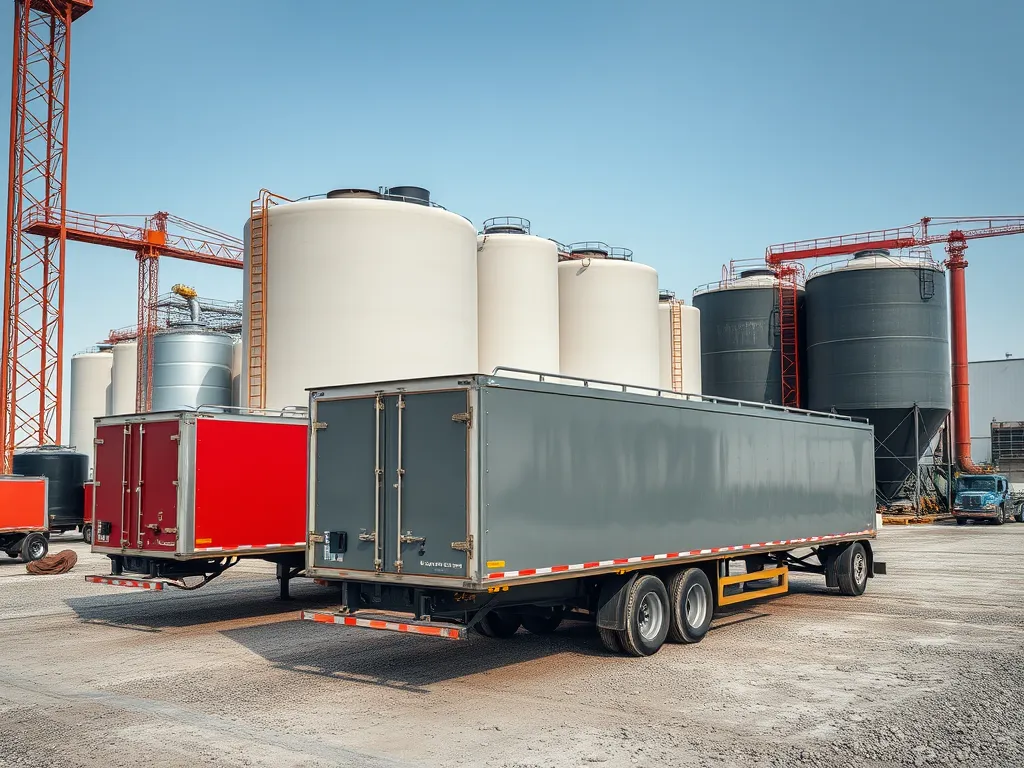
Cold Mix Asphalt Production Process
Cold mix asphalt production blends raw parts at low heat. This method cuts energy use. It suits small jobs or quick fixes. Let’s break down how it works.
Step-by-step Production Overview
Making cold mix needs five key steps:
- Mix design: Pick the right rocks, sand, and binder. Test for strength and water resistance.
- Binder prep: Stir bitumen emulsion or cutback. Keep temps below 140°F to avoid heat loss.
- Dry mixing: Add rocks and sand to a cold mix asphalt plant. Blend until smooth.
- Wet mixing: Pour binder into the mix. Run the cold asphalt mixing machine for 30-60 seconds.
- Curing: Store mix in sealed tanks. Let it sit 24-48 hours before use.
Essential Mixing Equipment and Techniques
Three tools shape cold mix quality:
- Batch plants: These cold mix asphalt plants handle 5-50 tons per hour. Portable units fit in trucks for on-site jobs.
- Paddle mixers: Steel blades in a cold patch asphalt mixer blend thick binders. Runs at 20-40 RPM to prevent lumping.
- Storage systems: Insulated tanks keep mix fresh for 6-12 months. Add anti-stick liners to avoid waste.
Pro tip: Use 2% lime in the mix. It boosts grip and stops water damage.
Now that you know how cold mix is made, let’s explore what gear costs and how to pick the right kit.
Also See: How Long After Asphalt Can You Drive on It?
Cost Analysis Of Cold Mix Asphalt Equipment
Budgeting for cold mix asphalt machinery requires balancing upfront investments with long-term project needs. Prices vary widely based on scale, automation, and production capacity.
Pricing by Equipment Type
Equipment costs depend on whether you’re mixing, transporting, or compacting materials. Let’s break down key categories.
Cold Mix Plants and Mixers
Stationary cold mix asphalt plants range from $50,000 to $250,000+ for high-output models producing 50-200 tons/hour. Portable batch plants cost $25,000-$80,000, ideal for small contractors. Pugmill mixers (used for cold patch asphalt mixing equipment) start at $5,000 for basic models, while twin-shaft mixers with automated controls hit $30,000. Cold patch asphalt mixer trailers add $8,000-$15,000 depending on capacity.
Compaction Machinery Costs
Vibratory rollers for cold mix compaction run $15,000-$80,000. Single-drum models like Sakai or Caterpillar dominate the mid-range ($35,000-$55,000). Asphalt lutes (manual grading tools) cost under $500, while box graders with adjustable blades reach $2,500. Plate compactors start at $1,200 for 5-ton models.
Factors Influencing Equipment Prices
Three elements drive costs: production capacity (tons/hour), portability, and automation. Diesel-powered cold mix asphalt plants cost 15-20% more than electric but handle remote sites. Advanced control panels add $10,000-$20,000. Regional market demand also impacts pricing—equipment in the Midwest U.S. often costs 8-12% less than coastal areas due to shipping logistics.
Buying New Vs. Used Equipment
New cold mix asphalt machinery offers warranties (typically 1-3 years) and compliance with EPA Tier 4 emission standards. Used equipment saves 30-50% upfront: a 2018 Etnyre cold mix plant retails for $90,000 vs. $160,000 new. Inspect used machines for wear in mixing paddles, gearboxes, and hydraulic systems. Leasing options exist for cold mix asphalt equipment for sale, with monthly payments starting at $1,200 for compactors.
Proper budgeting sets the stage for maintaining your equipment—a critical factor in protecting your investment.
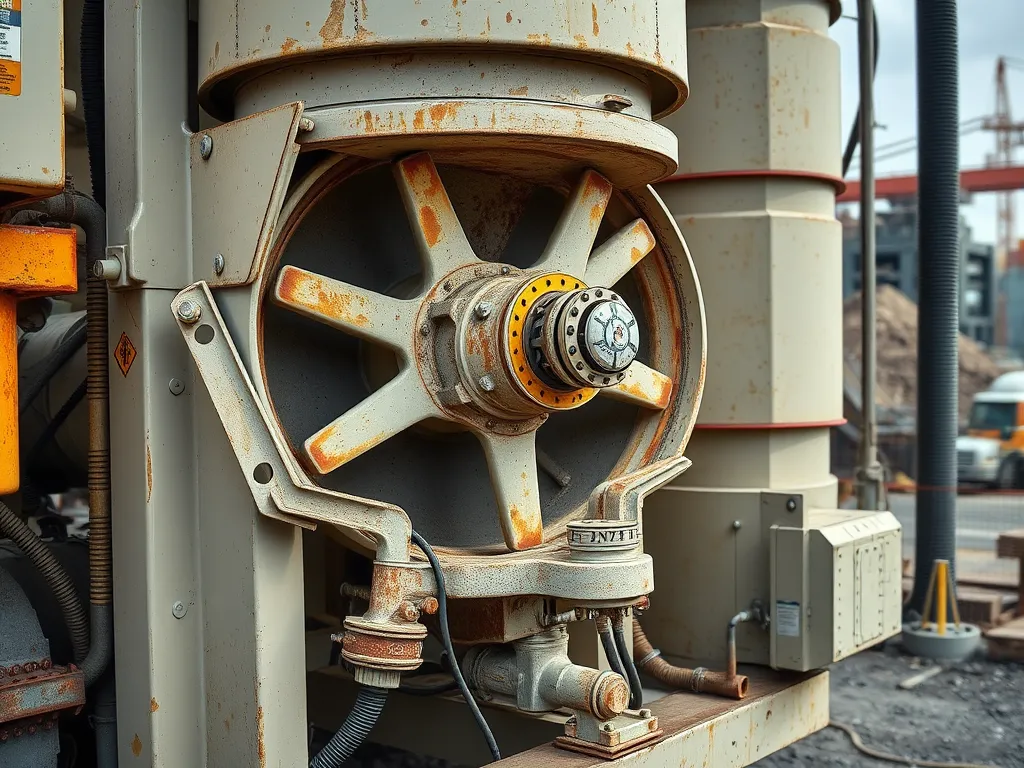
Maintenance Best Practices for Cold Mix Equipment
Proper upkeep extends the lifespan of cold mix asphalt machinery. Follow these guidelines to keep your equipment running at peak performance.
Routine Cleaning and Inspection
Daily cleaning prevents material buildup in mixers, hoppers, and conveyors. Use pressure washers (2,500–3,500 PSI) to remove hardened aggregates or bitumen residue. Check mixing blades for alignment and wear – replace if gaps exceed 1/8 inch. Inspect seals on cold mix asphalt plants weekly to avoid leaks that waste up to 15% of raw materials.
- Clear discharge chutes after each batch
- Test temperature gauges monthly for accuracy (±5°F tolerance)
- Lubricate bearings every 50 operating hours with high-viscosity grease
Preventing Wear and Tear
Schedule component replacements based on usage thresholds. Mixer paddles in cold asphalt mixing machines typically last 6–8 months with moderate use. Rotate tires on portable cold mix asphalt plants every 1,000 miles to prevent uneven tread wear. Monitor hydraulic systems for pressure drops – a 10% decline signals potential pump failure.
- Use OEM parts for gearboxes and motors to ensure compatibility
- Apply anti-corrosion coatings to steel surfaces in high-humidity areas
- Balance loads in cold patch asphalt mixers to avoid motor strain
Proactive maintenance cuts repair costs by up to 30% and boosts production efficiency by 15–20%.
Proper equipment care not only reduces downtime but also supports sustainable cold mix asphalt production. Next, let’s examine how these practices contribute to greener operations.
Environmental Impact Of Cold Mix Asphalt Production
Cold mix asphalt production stands out for its lower environmental strain compared to traditional hot mix methods. Equipment design and operational choices directly affect resource use, emissions, and long-term ecological balance.
Sustainability Benefits
Cold mix asphalt machinery eliminates high-temperature heating, slashing energy demands by up to 50% versus hot mix plants. Portable cold mix asphalt plants reduce transportation needs, cutting fuel use and site disruption. Recycled materials like reclaimed asphalt pavement (RAP) integrate seamlessly into mixes, with some systems processing 30-60% RAP content. Cold patch asphalt mixers also minimize material waste during repairs, extending pavement life without full-depth replacement.
Reducing Carbon Footprint
Modern cold asphalt mixing machines emit 80% fewer greenhouse gases than hot mix counterparts. Advanced emulsion technologies in cold mix asphalt production equipment lower volatile organic compound (VOC) releases by 40-70%. Efficient compaction machinery like vibratory rollers ensures proper density in fewer passes, trimming diesel consumption. Storage tanks and trailers designed for cold mix asphalt prevent spoilage, reducing raw material waste by 15-25% annually.
As sustainability drives equipment innovation, cost factors remain pivotal for adoption. Up next: breaking down expenses for plants, mixers, and compactors.
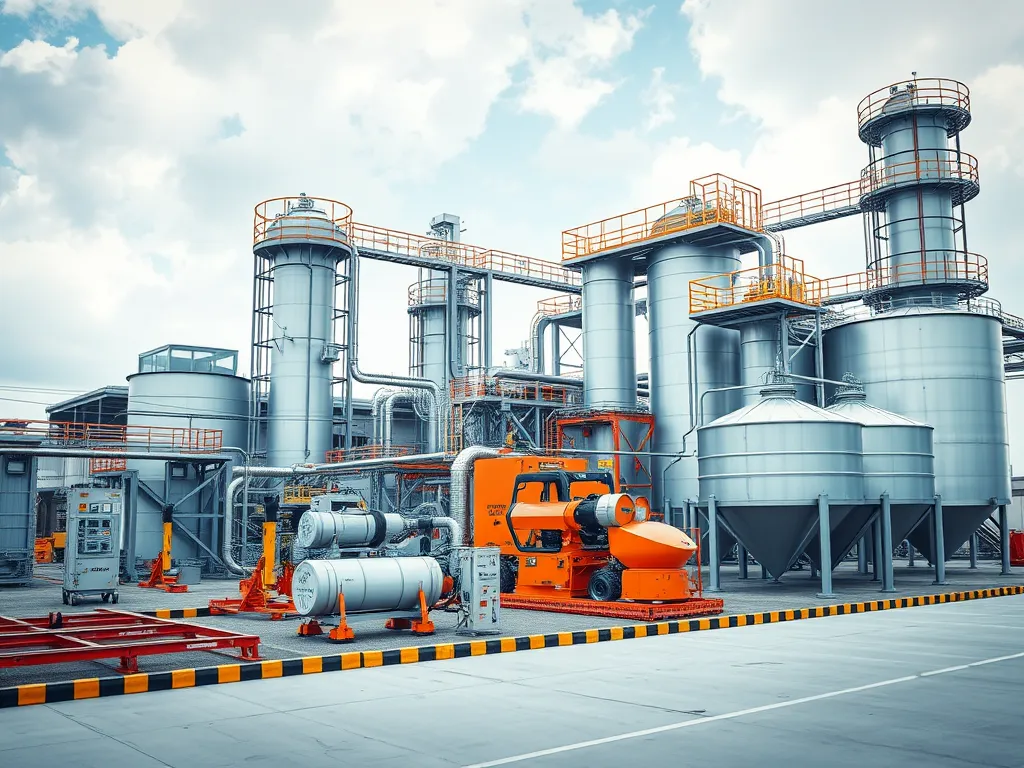
Frequently Asked Questions (FAQs)
How Much Does a Ton Of Cold Mix Asphalt Cost?
The cost of a ton of cold mix asphalt typically ranges from $70 to $150, depending on factors like location, supplier, and specific material specifications.
What Are the Components Of Cold Mix Asphalt?
Cold mix asphalt consists of three key components: aggregates (crushed stone or gravel), bitumen emulsion (a liquid asphalt binder), and various additives to enhance performance.
What Are the Disadvantages Of Cold Mix Asphalt?
While cold mix asphalt has practical applications, some disadvantages include lower strength compared to hot mix asphalt, longer curing times, and sensitivity to weather conditions during application.
What is the Average Price Of Cold Mix Asphalt Equipment?
The average price of cold mix asphalt equipment varies widely. Small mixers cost around $3,000 to $8,000, while larger stationary plants can range from $50,000 to over $250,000 depending on capacity and features.
Where Can I Purchase Cold Mix Asphalt Equipment?
You can purchase cold mix asphalt equipment from specialized manufacturers, construction supply companies, and through online marketplaces. It’s also advisable to check local distributors for potential discounts.
Are Used Cold Mix Asphalt Machines Reliable?
Used cold mix asphalt machines can be reliable if they are in good condition and have been well-maintained. It’s essential to inspect these machines for wear and check their operational history before making a purchase.
Who Manufactures Cold Mix Asphalt Equipment?
Several manufacturers produce cold mix asphalt equipment, including well-known companies like Caterpillar, Astec Industries, and Etnyre. Researching each brand’s offerings can help determine the best fit for specific needs.
Closing Thoughts
Cold mix asphalt equipment plays a vital role in modern road construction and maintenance. By understanding the production process, costs, and types of machines available, you can make informed decisions tailored to your project needs. From portable plants to specialized mixers, each piece of equipment contributes to creating durable, cost-effective asphalt solutions.
Moreover, considering the environmental benefits, such as reduced carbon footprints and recyclable materials, further emphasizes why cold mix asphalt is gaining popularity. Regular maintenance and proper handling of equipment will ensure longevity and efficiency.
For more comprehensive insights into cold mix asphalt and other related topics, check out Asphalt Calculator USA. Equip yourself with the knowledge to optimize your asphalt projects.

